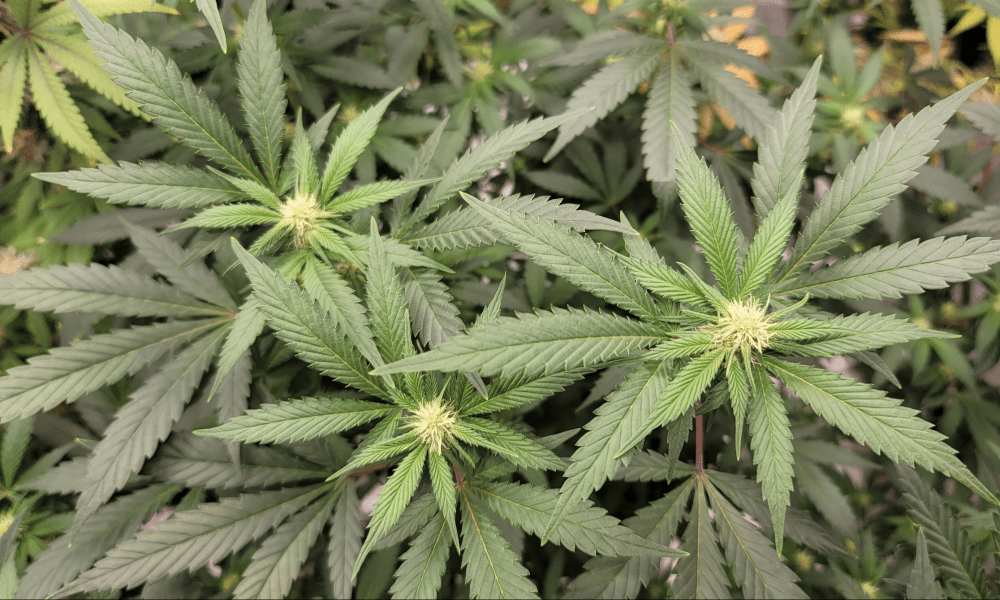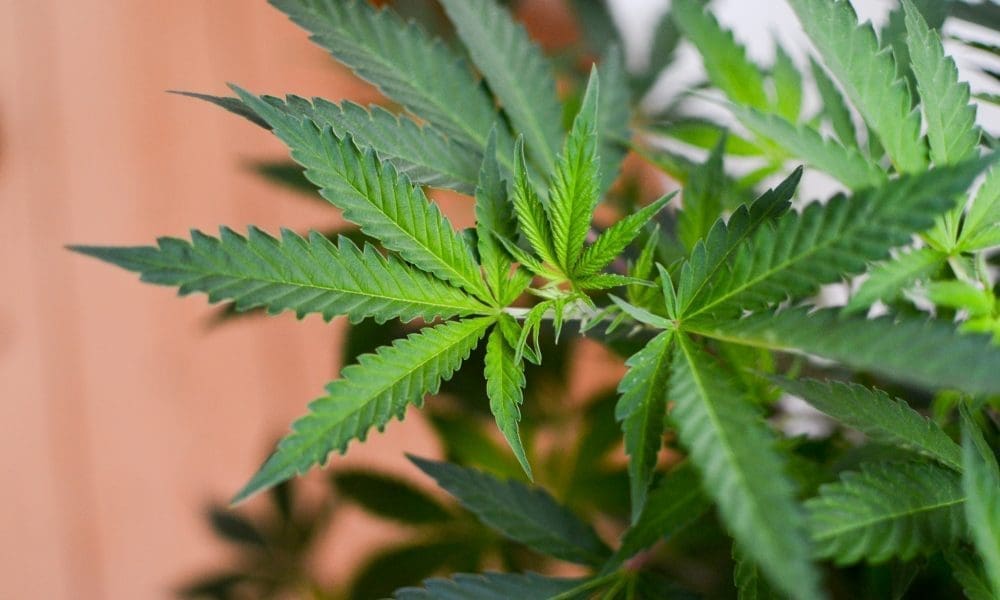featured
Missouri Officials Award Contract For Marijuana Market Study That Will Help Determine Whether To Issue New Licenses
Published
8 hours agoon

“As it relates to cannabis markets, Missouri is pretty famously the model to follow. So I’m very interested in doing a super deep dive.”
By Rebecca Rivas, Missouri Independent
New York-based Cannabis Public Policy Consulting LLC was awarded a contract this month to study Missouri’s marijuana market for the next year.
The group’s $238,700 contract to conduct an economic-impact study will help the state determine “whether or when the state will be required to issue additional cannabis facility licenses and, if so, how many, where, and of what type,” according to a March press release from the Missouri Department of Health and Senior Services.
Currently, department rules allows only a handful of licenses more than the minimum number required by the constitutional amendments that legalized medical and, subsequently, recreational marijuana for adults.
As a result, the department has issued nearly 400 licenses for cultivation, manufacturing facilities and dispensaries. The rules, for example, allow 27 dispensary licenses in each of the state’s eight congressional districts, while the Constitution requires a minimum of 24.
The state will also eventually have 144 microbusiness licenses, which are limited in size and scope and meant to benefit disadvantaged business owners.
In 2024, Missouri recorded $1.46 billion in total marijuana sales in the state’s second year of adult-use marijuana, outperforming states with a longer history of marijuana legalization like Arizona, Colorado and Nevada.
“As it relates to cannabis markets, Missouri is pretty famously the model to follow,” Mackenzie Slade, the group’s CEO and owner, told The Independent in April. “So I’m very interested in doing a super deep dive.”
Three companies were vying for the contract this spring. One applicant, Oregon-based Whitney Economics, conducts cannabis studies globally but failed to meet one of the requirements regarding managers, according to the state’s bid evaluation.
The other was St. Louis-based Capital Consulting Services, a certified Missouri minority-owned business enterprise that has helped governments with economic feasibility studies for 15 years on a state and federal level. The group submitted a higher bid of $360,000 than Slade’s company and didn’t have as much experience studying cannabis markets.
Founded in 2019, Cannabis Public Policy Consulting is a “100% woman-owned collective of researchers, data scientists, public health professionals, and policy experts working together toward a unified goal: to bring much-needed data, innovation, and nuance to cannabis research and policymaking,” the contract states.
Before becoming an independent LLC, the group worked together as a consulting team incubated by Advocates for Human Potential Inc. and have produced similar market reports for about 12 cannabis regulatory agencies over the last six years, the contract states. That includes the states of Maine, Maryland, Virginia, Oklahoma, New Mexico, Michigan and Utah.
“For a dozen government contracts, CPPC has performed the exact same scope of services as outlined in the RFP; supply and demand assessments and predictive modeling,” it states.
Slade’s company administers a national survey on cannabis use, which essentially measures and quantifies demand behavior for consumers. One of the things that they use it for, she said, at a national level is to try to understand how states are performing based on their policies.
“And Missouri continuously outperforms other states, relative to their date of sale,” she told The Independent, “…because they were able to stand up a market so quickly.”
That was in part, she said, because Missouri limited the number of licenses to get operational within just a few months. For the study, Slade proposed to use the state’s track and trace data to identify the efficiencies of the licenses.
“That’s a prime example of where we would uncover some extremely important considerations for policy,” she said. “And I do believe that the intent of the study is to identify areas of policy that need to be updated.”
Experts generally agree that Missouri’s decision to only issue a few more than the minimum licenses allowed under the constitution has been the key to the industry’s boom. However, critics have long argued that the decision created a monopoly that’s kept out opportunities for people who were most impacted by the war on drugs. While the microbusiness license program was included in the 2022 constitutional amendment to address inequities, the limitations on what these businesses can do make it difficult to turn a profit.
If the department does issue additional licenses, at least half of those licenses must be awarded to owners of cannabis microbusiness facilities that have been operational for at least a year.
The study will also provide information regarding the overall economic stability of the regulated market, including strengths and risks, with a special emphasis on the market’s impact on economically distressed areas of the state, according to the state’s press release.
The Constitution requires the department to develop a plan to “promote and encourage ownership and employment in the marijuana industry by people from political subdivisions and districts that are economically distressed.”
“The study will provide information,” the release states, “relevant to creating and implementing such a plan.”
This story was first published by Missouri Independent.
Photo courtesy of Mike Latimer.

Author: mscannabiz.com
MScannaBIZ for all you Mississippi Cannabis News and Information.
You may like

Edibles have become mainstream and this summer a a fresh flavor has burst on the scene!
Edibles have been become mainstream, from Gen Z using them to manage anxiety to boomers using them for pain management, they are now part of a majority of people’s lives. Gummies make up over 85% of the edible market, but can you guess the new hot flavor for cannabis this summer? Watermelon, blue raspberry, raspberry and strawberry have been key flavors in the edibles market. But this summer, there is a most have new taste for your chill.
RELATED: How Marijuana Can Heighten Intimacy With Your Partner
Orange is taking center stage in the cannabis world, quickly becoming the must-try flavor of the season. From citrusy sativas to tangy vape cartridges and edibles, consumers are reaching for strains and products with bold orange notes that promise both flavor and effect.

Strains like Orange Creamsicle, Tangie, and Clementine are flying off dispensary shelves, praised for their uplifting, energetic highs and zesty terpene profiles. The dominant terpenes—like limonene and myrcene—not only offer mood-boosting benefits but also deliver that unmistakable sweet-tart aroma reminiscent of fresh oranges and summer sunshine.
“Orange is a popular flavor lately. Customers love a citrus strain, and the trend is shifting from lemons and limes to orange. Watermelon used to be the top flavor across all categories, but blue raspberry has taken its place. Watermelon is still a top 5 flavor though,” said Ryan Torchin, GM & Buyer Planet 13 Orange County.
Cannabis brands are leaning into the trend, launching orange-infused gummies, live resin concentrates, and pre-rolls designed to capture that bright, refreshing essence. With consumer preferences shifting toward flavorful, fruit-forward experiences, orange hits the perfect note between nostalgia and novelty.
RELATED: Being A Couch Potato Changes Your Personality
One of the new tasty strains flying off the shelf is Orange Push Pop. It is also known as Emergen-C, and is an exhilarating strain brought to you by the master breeders at Seed Junky Genetics. With its lineage rooted in Orange Push Pop crossed with the classic Sherbet strain, this variety sets the bar high for aromatic and flavorful experiences. Orange Push Pop is as visually appealing as it is flavorful. Orange Push Pop has this sweet, juicy orange smell which is hard to resist and a hint of creaminess. It is similar to the orange creamsicle.
Whether you’re a seasoned user or just exploring the scene, this citrus wave offers a delicious way to enjoy cannabis with a seasonal twist. Keep your eye on orange—it’s more than a flavor, it’s the summer’s statement strain.

Author: mscannabiz.com
MScannaBIZ for all you Mississippi Cannabis News and Information.
featured
Florida Marijuana Campaign Has Collected Nearly 70 Percent Of Signatures Needed To Put Legalization Initiative On 2026 Ballot, State Data Shows
Published
4 hours agoon
July 2, 2025
A Florida campaign seeking to qualify a marijuana legalization initiative for the state’s 2026 ballot has now collected nearly 70 percent of the required signatures to put the measure before voters.
Almost six months after the campaign Smart & Safe Florida first filed the measure, the latest data from the state Division of Elections shows that advocates have gathered 613,214 of the needed 880,062 signatures to secure ballot placement.
This comes after the group made the 2024 ballot with a prior version of the legalization proposal that fell short of a steep 60 percent vote threshold to pass.
Last month, the state affirmed that the campaign collected enough for the 2026 initiative to trigger a fiscal and judicial review.
Gov. Ron DeSantis (R) said in February that the newest measure is in “big time trouble” with the state Supreme Court, predicting it will be blocked from going before voters next year.
“There’s a lot of different perspectives on on marijuana,” DeSantis said. “It should not be in our Constitution. If you feel strongly about it, you have elections for the legislature. Go back candidates that you believe will be able to deliver what your vision is on that.”
“But when you put these things in the Constitution—and I think, I mean, the way they wrote, there’s all kinds of things going on in here. I think it’s going to have big time trouble getting through the Florida Supreme Court,” he said.
In addition to collecting 880,062 valid signatures from registered voters, Smart & Safe Florida must gather them from a minimum of 8 percent of voters in at least half of the state’s congressional districts. The campaign has currently exceeded the needed threshold in just three of the 28 districts, but is close in several others.
Marijuana Moment reached out to the campaign for comment, but a representative was not immediately available.
At its current signature count, the campaign has already succeeded in reaching one of the first milestones. The state is now statutorily obligated to conduct a judicial and financial review of the measure that will determine its legal eligibility and inform the electorate about its potential economic impact.
The latest initiative was filed with the secretary of state’s office just months after the initial version failed during the November 2024 election—despite an endorsement from President Donald Trump.
Smart & Safe Florida is hoping the revised version will succeed in 2026. The campaign—which in the last election cycle received tens of millions of dollars from cannabis industry stakeholders, principally the multi-state operator Trulieve—incorporated certain changes into the new version that seem responsive to criticism opponents raised during the 2024 push.
For example, it now specifically states that the “smoking and vaping of marijuana in any public place is prohibited.”Another section asserts that the legislature would need to approve rules dealing with the “regulation of the time, place, and manner of the public consumption of marijuana.”
Last year, the governor accurately predicted that the 2024 cannabis measure from the campaign would survive a legal challenge from the state attorney general. It’s not entirely clear why he feels this version would face a different outcome.
While there’s uncertainty around how the state’s highest court will navigate the measure, a poll released in February showed overwhelming bipartisan voter support for the reform—with 67 percent of Florida voters backing legalization, including 82 percent of Democrats, 66 percent of independents and 55 percent of Republicans.
However, the results conflict with another recent poll from the Florida Chamber of Commerce, a proactive opponent of legalization, that found majority support for the reform among likely voter (53 percent) but not enough to be enacted under the 60 percent requirement.
In the background of the campaign’s signature development, DeSantis signed a GOP-led bill last month to impose significant restrictions on the ability to put initiatives on the ballot—a plan that could impair efforts to let voters decide on marijuana legalization next year.
—
Marijuana Moment is tracking hundreds of cannabis, psychedelics and drug policy bills in state legislatures and Congress this year. Patreon supporters pledging at least $25/month get access to our interactive maps, charts and hearing calendar so they don’t miss any developments.![]()
Learn more about our marijuana bill tracker and become a supporter on Patreon to get access.
—
Separately, a Florida GOP senator claimed recently that the legalization campaign “tricked” Trump into supporting the 2024 measure by misleading him and the general public about key provisions.
Ahead of the election, Trump said in September that he felt Amendment 3 was “going to be very good” for the state.
Before making the comments, Trump met with the CEO of Trulieve, Kim Rivers, as well as with a GOP state senator who is in favor of the reform.
While Trump endorsed the Florida cannabis initiative—as well as federal rescheduling and industry banking access—he has since been silent on cannabis issues. And his cabinet choices have mixed records on marijuana policy.
Meanwhile in Florida, some medical marijuana patients and caregivers in Florida could see their state cannabis registrations revoked under a bill signed into law by DeSantis this week.
DeSantis on Monday signed SB 2514, a broad budget bill that touches on cancer, dentistry and other health-related matters. But it also contains a provision that directs the state Department of Health (DOH) to cancel registrations of medical marijuana patients and caregivers if they’re convicted of—or plead guilty or no contest to—criminal drug charges.
DeSantis Signs Bill To Strip Florida Medical Marijuana Cards From People With Drug Convictions
Photo courtesy of Philip Steffan.

Author: mscannabiz.com
MScannaBIZ for all you Mississippi Cannabis News and Information.
featured
Hawaii Governor Signs Medical Marijuana Expansion Bill, After Calling One Of Its Provisions ‘A Grave Violation Of Privacy,’
Published
5 hours agoon
July 2, 2025
On the heels of signaling a possible veto of a bill meant to expand access to medical marijuana in Hawaii, Gov. Josh Green (D) instead signed the measure into law over the weekend, regardless of a provision he recently described as “a grave violation of privacy.”
HB 302 will make two main reforms around patient access. First, it allows a patient’s primary treating medical provider to recommend marijuana for any malady they see fit, regardless of whether it’s a specified qualifying condition in Hawaii. It also allows patients to receive medical cannabis recommendations through telehealth visits rather than having to establish an in-person relationship with a provider.
Before lawmakers sent the bill to Green, a conference committee revised the plan, inserting a provision to allow the state Department of Health to access medical marijuana patient records held by doctors for any reason whatsoever.
The revised bill authorizes the Department of Health to “inspect a qualifying patient’s medical records held by the physician, advanced practice registered nurse, or hospice provider who issued a written certification for the qualifying patient.” Providers who don’t comply with a department request for a patient’s records could see their ability to issue medical cannabis revoked.
Advocates initially supported HB 302 as a means to expand access to patients with conditions beyond those specified under state law. But many withdrew support following the conference committee’s changes.
An additional provision establishes a new Class C felony for unlicensed operation of a dispensary, adding another major charge on top of the state’s existing laws against illegal distribution of marijuana.
In early June, Green himself put the cannabis measure on a list of bills he intended to veto—an indication, though not a commitment, that he was leaning towards rejecting it.
“Although this bill’s authorization of medical cannabis certifications via telehealth expands access to medical cannabis,” his office wrote at the time, “provisions authorizing the inspection of patients’ medical records without warrant constitute a grave violation of privacy.”
Green acknowledged patients might be especially concerned about removing privacy protections given that marijuana remains federally illegal, noting that those concerns could actually limit enrollment in the state-legal system.
“Given that the federal government classifies cannabis as a Schedule I substance,” his office said at the time, “patients’ reasonable fears of repercussions based upon information gained from inspection of their personal medical records may deter patients from participating in the medical cannabis program.”
The bill remained on the governor’s intent-to-veto list even after the office revised it a week ago.
In signing HB 302 into law on Sunday, Green did not indicate what led to his change of heart.
Nikos Leverenz, of the Drug Policy Forum of Hawai’i and the Hawai’i Health and Harm Reduction Center, told Marijuana Moment that he felt the state has “moved backward” protecting individual autonomy around cannabis in the past year, and “HB 302 is an exemplar of that regression.”
“Providing government attorneys with the authority to inspect doctor-patient records and funding more law enforcement positions will serve to further deteriorate an already anemic medical cannabis system in Hawaii,” he wrote in an email.
Leverenz called on Green to “take the lead and advance bills in the next legislative session that actually serve to expand access to medical cannabis.”
“Measures toward this end include statutory employment protections for registered medical cannabis patients, authorizing access to medical cannabis products for patients in hospice and long-term care settings (Ryan’s Law), and allowing certifying providers broad professional discretion to recommend its use,” he added.
Some lawmakers warned at the time of the conference committee changes to HB 302 that its new medical records provision would be a sticking points for would-be patients.
“The medical cannabis community has expressed its opposition to this breach of confidentiality,” Rep. Kim Coco Iwamoto (D) said last month, “especially since it is authorized without any suspicion of wrongdoing and without a warrant. This will further deter already low patient and provider participation.”
Iwamoto called the proposal “unprecedented given the degree of respect our state has previously demonstrated for patient–doctor privileges, and how often the state defers to the expertise of physicians and healthcare providers.”
Other measures recently sent to the governor’s desk include SB 1429, which would allow medical marijuana caregivers to grow marijuana on behalf of up to five patients rather than the current one. Green signed that bill late last month.
Lawmakers also recently sent a bill to the governor that would help speed the expungement process for people hoping to clear their records of past marijuana-related offenses—a proposal Green signed into law in April.
That measure, HB 132, from Rep. David Tarnas (D), is intended to expedite expungements happening through a pilot program signed into law last year by Gov. Josh Green (D). Specifically, it will remove a distinction between marijuana and other Schedule V drugs for the purposes of the expungement program.
The bill’s proponents said the current wording of the law forces state officials to comb through thousands of criminal records manually in order to identify which are eligible for expungement under the pilot program.
Hawaii’s Senate back in February narrowly defeated a separate proposal that would have increased fivefold the amount of cannabis that a person could possess without risk of criminal charges. The body voted 12–11 against the decriminalization measure, SB 319, from Sen. Joy San Buenaventura (D).
Had the measure become law, it would have increased the amount of cannabis decriminalized in Hawaii from the current 3 grams up to 15 grams. Possession of any amount of marijuana up to that 15-gram limit would have been classified as a civil violation, punishable by a fine of $130.
A Senate bill that would have legalized marijuana for adults, meanwhile, ultimately stalled for the session. That measure, SB 1613, failed to make it out of committee by a legislative deadline.
While advocates felt there was sufficient support for the legalization proposal in the Senate, it’s widely believed that House lawmakers would have ultimately scuttled the measure, as they did last month with a legalization companion bill, HB 1246.
Last session, a Senate-passed legalization bill also fizzled out in the House.
This year’s House vote to stall the bill came just days after approval from a pair of committees at a joint hearing. Ahead of that hearing, the panels received nearly 300 pages of testimony, including from state agencies, advocacy organizations and members of the public.
This past fall, regulators solicited proposals to assess the state’s current medical marijuana program—and also sought to estimate demand for recreational sales if the state eventually moves forward with adult-use legalization. Some read the move as a sign the regulatory agency saw a need to prepare to the potential reform.

Author: mscannabiz.com
MScannaBIZ for all you Mississippi Cannabis News and Information.

Coast Guard offloads cocaine, marijuana at its Miami Beach base

Guess The New Hot Flavor For Cannabis This Summer
Access Denied

How to roll a hash hole

I-TEAM: Video captures Toledo Police officer buying marijuana while on duty, in uniform

The easiest hash to make at home

See the newest recreational marijuana shop to open in Minnesota

Florida Marijuana Campaign Has Collected Nearly 70 Percent Of Signatures Needed To Put Legalization Initiative On 2026 Ballot, State Data Shows

Hawaii Governor Signs Medical Marijuana Expansion Bill, After Calling One Of Its Provisions ‘A Grave Violation Of Privacy,’

Cannabist Cultivation Workers Ratify 1st Union Contract in New Jersey

Matt Gaetz Spotted Reviewing Lucrative Contract With Trulieve

Delaware to begin recreational marijuana sales on August 1

Missouri Officials Award Contract For Marijuana Market Study That Will Help Determine Whether To Issue New Licenses

How CBD Can Help Dogs With Loud Noises

Cannabis regulators order testing lab to suspend operations

AYR Wellness Misses Interest Payment on Outstanding Senior Notes

Nebraska: Regulators Enact Emergency Rules Repealing Patients’ Access To Botanical Cannabis

Adult-Use Cannabis Sales to Launch in Delaware Next Month

8 In 10 Marijuana Consumers Use It As A Substitute For Prescription Drugs, New Survey Finds

Cronos Grows International Footprint in Switzerland

Manitoba increases cannabis markup, considers other changes

New Jersey Officials Are Now Accepting Marijuana Consumption Lounge Applications From All Dispensaries

Congressional Cannabis Caucus still hasn’t met this year (Newsletter: July 2, 2025)

Some cannabis shops in Northern California say new state tax means tougher choices

Alert: Department of Cannabis Control updates data dashboards with full data for 2023

Connecticut Appoints The US’s First Cannabis Ombudsperson – Yes there is a pun in there and I’m Sure Erin Kirk Is Going To Hear It More Than Once!

5 best CBD creams of 2024 by Leafly

Free delta-9 gummies from Bay Smokes

EU initiative begins bid to open access to psychedelic therapies
New Study Analyzes the Effects of THCV, CBD on Weight Loss

Mississippi city official pleads guilty to selling fake CBD products

May 2024 Leafly HighLight: Pink Runtz strain

Curaleaf Start Process Of Getting Their Claws Into The UK’s National Health System – With Former MP (Resigned Today 30/5/24) As The Front Man

5 best autoflower seed banks of 2024 by Leafly

Horn Lake denies cannabis dispensary request to allow sale of drug paraphernalia and Sunday sales | News

Discover New York’s dankest cannabis brands [September 2024]

Press Release: CANNRA Calls for Farm Bill to Clarify Existing State Authority to Regulate Hemp Products

Local medical cannabis dispensary reacts to MSDH pulling Rapid Analytics License – WLBT

Nevada CCB to Accept Applications for Cannabis Establishments in White Pine County – “Only one cultivation and one production license will be awarded in White Pine County”

The Daily Hit: October 2, 2024

6 best CBD gummies of 2024 by Leafly

5 best THC drinks of 2024 by Leafly

5 best delta-9 THC gummies of 2024 by Leafly

Weekly Update: Monday, May 13, 2024 including, New Guide for Renewals & May Board meeting application deadline

People In This State Googled ‘Medical Marijuana’ The Most, Study Shows

Thailand: Pro-cannabis advocates rally ahead of the government’s plan to recriminalize the plant

PRESS RELEASE : Justice Department Submits Proposed Regulation to Reschedule Marijuana

Press Release: May 9, STIIIZY and Healing Urban Barrios hosted an Expungement Clinic & Second Chance Resource Fair
Trending
-

 California Cannabis Updates1 year ago
California Cannabis Updates1 year agoAlert: Department of Cannabis Control updates data dashboards with full data for 2023
-

 Breaking News1 year ago
Breaking News1 year agoConnecticut Appoints The US’s First Cannabis Ombudsperson – Yes there is a pun in there and I’m Sure Erin Kirk Is Going To Hear It More Than Once!
-

 best list11 months ago
best list11 months ago5 best CBD creams of 2024 by Leafly
-

 Bay Smokes1 year ago
Bay Smokes1 year agoFree delta-9 gummies from Bay Smokes
-

 Business10 months ago
Business10 months agoEU initiative begins bid to open access to psychedelic therapies
-

 cbd1 year ago
cbd1 year agoNew Study Analyzes the Effects of THCV, CBD on Weight Loss
-

 Mississippi Cannabis News1 year ago
Mississippi Cannabis News1 year agoMississippi city official pleads guilty to selling fake CBD products
-

 California1 year ago
California1 year agoMay 2024 Leafly HighLight: Pink Runtz strain






